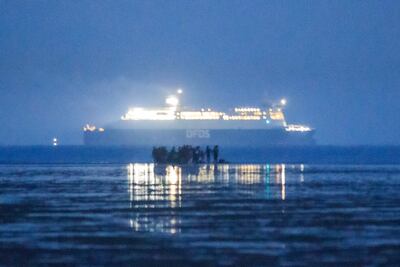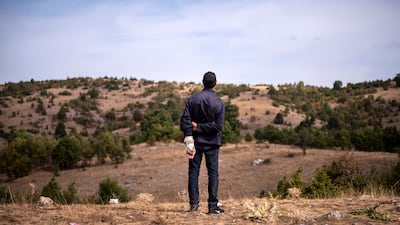Britain’s plans to send illegal immigrants for processing in a third country were in doubt on Monday after the Albanian government angrily denied it would be used as a base.
Reports at the weekend suggested that Albania had agreed to host an offshore detention centre for illegal immigrants who cross the English Channel in small boats from France.
Under the plan, people picked up off the English coast would have been flown 2,400 kilometres to the Balkan country while their claims were processed.
Talks between London and officials in Tirana had been finalised to fix Albania as an offshore hub after other venues have been ruled out, The Sun newspaper first reported, with British Home Secretary Priti Patel fully behind the plan.
But Albania’s foreign minister strenuously denied any such agreement. “So embarrassing the fake news spreading in the British media about an ‘offshore hub in the Balkans’ namely in Albania to ‘detain migrants crossing Channel from France’,” Olta Xhacka said on Twitter.
She also went on to condemn the British policy, saying Albania would “never be a hub of anti-immigration policies of bigger and richer countries.”
Ms Xhacka said she had told the Albanian embassy in London to demand a retraction of the story.

Albania’s director of communications also issued a strong denial, condemning the story as “completely untrue”.
“We do our duty to the tradition of our children, not the duty of those who are greater and richer than we are,” Endri Fuga said on Twitter.
He added that Albania was “proud” to host 4,000 Afghan refugees who had fled the Taliban.
Albania has also become part of a route for migrants from north Africa and the Middle East heading to Europe via Greece.
Migrants or refugees who don’t want to stay in Greece have several options, all illegal: To stow away on a ferry — or buy a berth on a smuggling boat — for Italy; use fake papers to catch a flight out; or walk through Bulgaria, North Macedonia or Albania.
And with Bulgaria being seen as too dangerous, and North Macedonia increasingly well guarded, large numbers are opting for Albania, even though its patrols are strengthened by officers from the European Union’s Frontex border agency. Police data show Albania has seen a rise in arrests for illegal entry this year, while North Macedonia — outside which 10,000 people had camped five years ago waiting to sneak in — reports a decline.
Albanian interior ministry spokesman Ardian Bita said last week his country is “doing its utmost to fight the organised crime” groups that help traffic migrants, and has arrested “a considerable number” of smugglers this year.
The main base for the crossings is an abandoned army guard house — filthy and decrepit — and the surrounding woods a few hundred meters from the border, a half-hour’s walk from the closest Greek village of Ieropigi and 220 kilometres west of Greece’s second-largest city, Thessaloniki. There’s water from a pumping station, from which some also tap electricity to charge their phones.
UK plans for a national overseas processing centre as part of the country's new Nationality and Borders Bill are now unclear after discussions with other countries have foundered too. Negotiations have failed with Denmark and Rwanda, as well as Ascension Island, the British South Atlantic territory.
The UK’s new approach mirrors a controversial policy in Australia where migrant are sent to camps in Papua New Guinea, which has been condemned by the International Criminal Court as “cruel, inhuman and degrading”.
The UK plan has come as a record 17,000 immigrants have crossed from France to Britain in the last nine months, many paying huge sums to people smugglers.
Ms Patel has said the overseas hub plan would deter people from attempting to make the dangerous 20-mile crossing between Britain and France. She said on Friday that governments “should be able to consider every single option” when dealing with asylum seekers.
A government representative said: “The New Plan for Immigration is the only long-term solution to fix the broken system, and includes changes to the law to tackle criminal gangs and prevent further loss of life.
“This is a shared, international challenge and we continue to work with other countries to meet it.”


